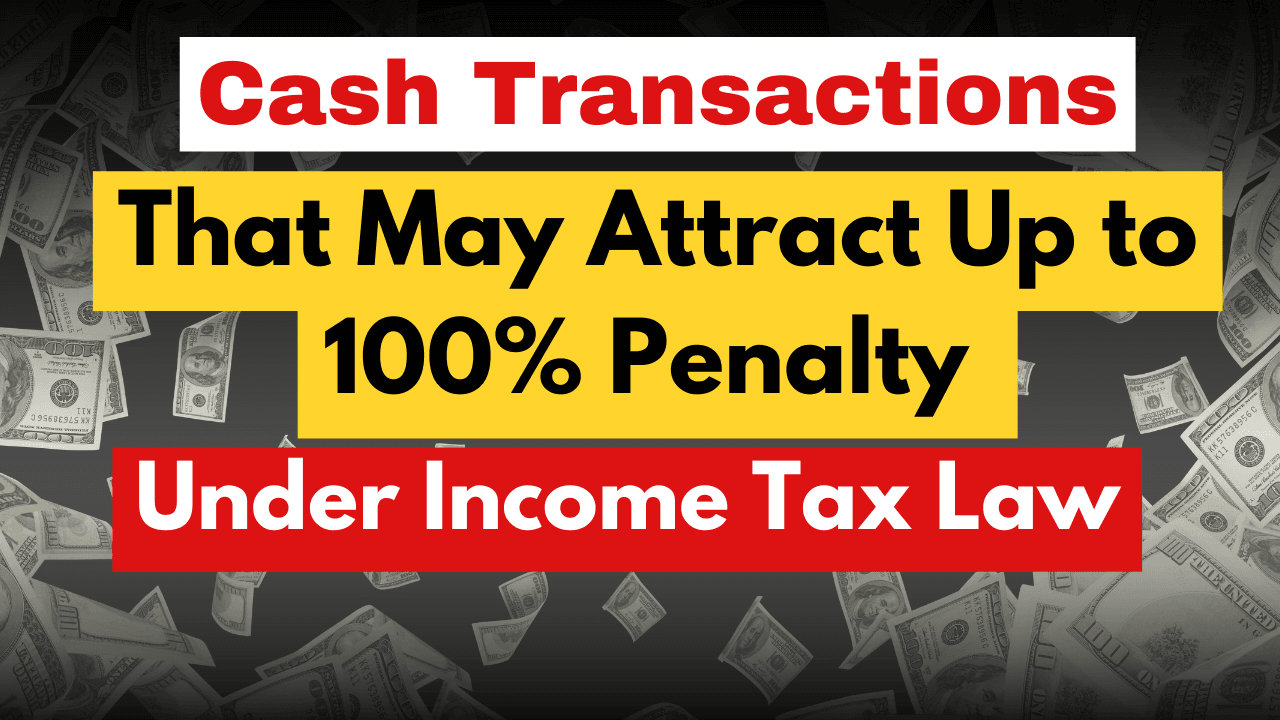Cash Transactions That May Attract Up to 100% Penalty Under Income Tax Law
Cash Transactions That May Attract Up to 100% Penalty Under Income Tax Law The Income Tax Department has implemented stringent rules to regulate cash transactions and ensure tax compliance. Non-adherence to these regulations can result in significant penalties, sometimes up to 100% of the transaction amount. Cash Transactions That May Attract Up to 100% Penalty Under Income Tax Law In this blog, we delve into the various scenarios where cash transactions can lead to penalties under the Income Tax Act.
1. Prohibition of Cash Transactions Exceeding ₹2 Lakh
Rule:
Section 269ST of the Income Tax Act prohibits the acceptance of cash payments exceeding ₹2 lakh in the following scenarios:
- From a single person in a single day.
- For a single transaction, even if the payment is split across multiple days.
- In respect of transactions related to one event or occasion.
Penalty:
The penalty for violating Section 269ST is 100% of the amount received. For example, if a person accepts ₹5 lakh in cash in violation of this section, they will be liable to pay a penalty of ₹5 lakh.
Exceptions:
- Transactions with the government.
- Payments received by banking companies, post offices, or cooperative banks.
- Other exceptions notified by the government.
- Limit on Cash Expenditures for Businesses
Rule:
Under Section 40A(3), any cash payment exceeding ₹10,000 made to a single person in a day is disallowed as a business expense. For transporters, the limit is slightly higher at ₹35,000.
Impact:
Such expenses are not considered valid deductions when calculating taxable income, leading to higher tax liability for businesses. For instance, if a business pays ₹20,000 in cash to a vendor, it cannot claim this amount as a deductible expense.
Exceptions:
- Payments made to government entities.
- Payments in regions where no banking facilities are available.
- Payments made under exceptional circumstances as notified by the government.
- Restrictions on Cash Loans and Repayments
Rule:
- Section 269SS prohibits accepting loans, deposits, or advances of ₹20,000 or more in cash.
- Section 269T prohibits repayment of loans, deposits, or advances of ₹20,000 or more in cash.
Penalty:
Violating these sections results in a penalty equal to the amount accepted or repaid in cash. For example, if a loan of ₹50,000 is accepted or repaid in cash, the penalty will also be ₹50,000.
Exceptions:
- Transactions between close relatives (as defined in the Income Tax Act).
- Transactions with government institutions, banks, or cooperative societies.
- Other notified exceptions.
- Donations in Cash
Rule:
Section 80G specifies that donations exceeding ₹2,000 in cash are not eligible for tax deductions. To claim a deduction, donations must be made through banking channels such as cheques, demand drafts, or digital payment methods.
Impact:
If a donor contributes ₹5,000 in cash to a charitable organization, they cannot claim a deduction for this amount, even if the organization is eligible to receive tax-deductible donations.
- Real Estate Transactions
Rule:
Section 269SS and Section 269T govern cash transactions in real estate. Any payment exceeding ₹20,000 related to the transfer of immovable property must be made through banking channels.
Penalty:
Violations attract penalties equivalent to the cash amount transacted. For example, if ₹50,000 is paid in cash for purchasing a property, the penalty will also be ₹50,000.
Impact on Capital Gains:
If payments are made in cash for purchasing a property, the amount may not be included in the cost of acquisition, leading to higher taxable capital gains.
- Cash Payments Affecting Capital Gains
Rule:
Section 43 of the Income Tax Act disallows payments made in cash for purchasing capital assets if the payment exceeds ₹10,000.
Impact:
Such payments are excluded when calculating the cost of acquisition, resulting in higher taxable capital gains. For example, if a property is purchased for ₹50 lakh but ₹2 lakh is paid in cash, the allowable cost of acquisition will be ₹48 lakh.
Other Noteworthy Points
- Cash Withdrawals:
- TDS is applicable on cash withdrawals exceeding ₹1 crore in a financial year under Section 194N. For taxpayers who have not filed their returns for the previous three years, the limit is reduced to ₹20 lakh.
- Medical Expenses:
- Payments exceeding ₹20,000 in cash for medical bills may not be allowed as deductions, except under specific notified conditions.
Consequences of Non-Compliance
Failing to adhere to these cash transaction rules can lead to:
- Hefty penalties, as outlined above.
- Increased scrutiny by the Income Tax Department.
- Loss of tax benefits and deductions.
Best Practices to Avoid Penalties
- Use Banking Channels: Prefer cheques, NEFT, RTGS, or UPI for large payments.
- Maintain Records: Cash Transactions That May Attract Up to 100% Penalty Under Income Tax Law Keep detailed records of all transactions, especially those above the prescribed limits.
- Understand the Rules: Stay updated with income tax laws to ensure compliance. Cash Transactions That May Attract Up to 100% Penalty Under Income Tax Law
- Consult Professionals: Cash Transactions That May Attract Up to 100% Penalty Under Income Tax Law Seek advice from tax consultants or chartered accountants for complex transactions.
Conclusion
The Income Tax Department’s restrictions on cash transactions aim to curb tax evasion and promote financial transparency. Violating these rules can result in severe financial repercussions. Cash Transactions That May Attract Up to 100% Penalty Under Income Tax Law By adhering to the prescribed limits and opting for digital or banking channels, individuals and businesses can ensure compliance and avoid penalties.
Stay informed and stay compliant to keep your financial dealings hassle-free. For more updates on taxation and compliance, follow our blog or connect with us on social media.
Sources Link – https://cfo.economictimes.indiatimes.com/news/tax-legal-accounting
New Updates Blog Check – https://taxgyany.com/blogs/
For Latest Compliances Updates Visit our Youtube Channel – https://youtu.be/p8JYpXRvxUY?si=qcyn1Aba9mUmnZzr


1 thought on “Cash Transactions That May Attract Up to 100% Penalty Under Income Tax Law”
Comments are closed.